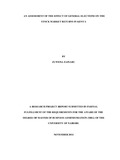| dc.description.abstract | The main aim of the study was to establish the effect of the general elections on the
return of the stock market in Kenya. This is an empirical study that analyzed the stock
market returns during electioneering periods in Kenya. The study covered the period
between 1997 and 2013. This period is selected because during the competitive
general presidential, parliamentary and civic elections were held compared to
previous general elections which did not include many political parties. The NSE
index performance during this period was analyzed and the performance of the NSE
index during election years compared to none election years. Descriptive research
design was applied. The population of the study was the 61 listed companies at NSE.
The study used secondary data, this constituted of data for the Nairobi Securities
indices from 1996 to 2013 and data of each general election in the years 1997, 2002,
2007 and 2013 taken as event date: 27th December 1997, 26th December 2002, 26th
December 2007 and 4th March 2013.
From the research findings, it was noted that investors tend to include forward
looking expectations, implying that voters incorporated speculative expectations into
their assessment of macroeconomic indicators. From the analysis and the research
findings, it was noted that stock market returns tend be affected by the presence of
election trends. A higher level of policy uncertainty increases the risk of holding
assets with returns that depend on economic policies. The study recommends that
investors should carefully plan and carry out investments during and after the periods
of the general elections as the returns could be affected either positively or negatively
during that period. Elections can have important consequences in the stock market;
therefore investors can devote a certain portion of money to invest in stocks before
and another in stocks after elections. Many investors simply invest in stocks after
elections where they presume that the market will be performing well as a result of
the new regime. | en_US |

